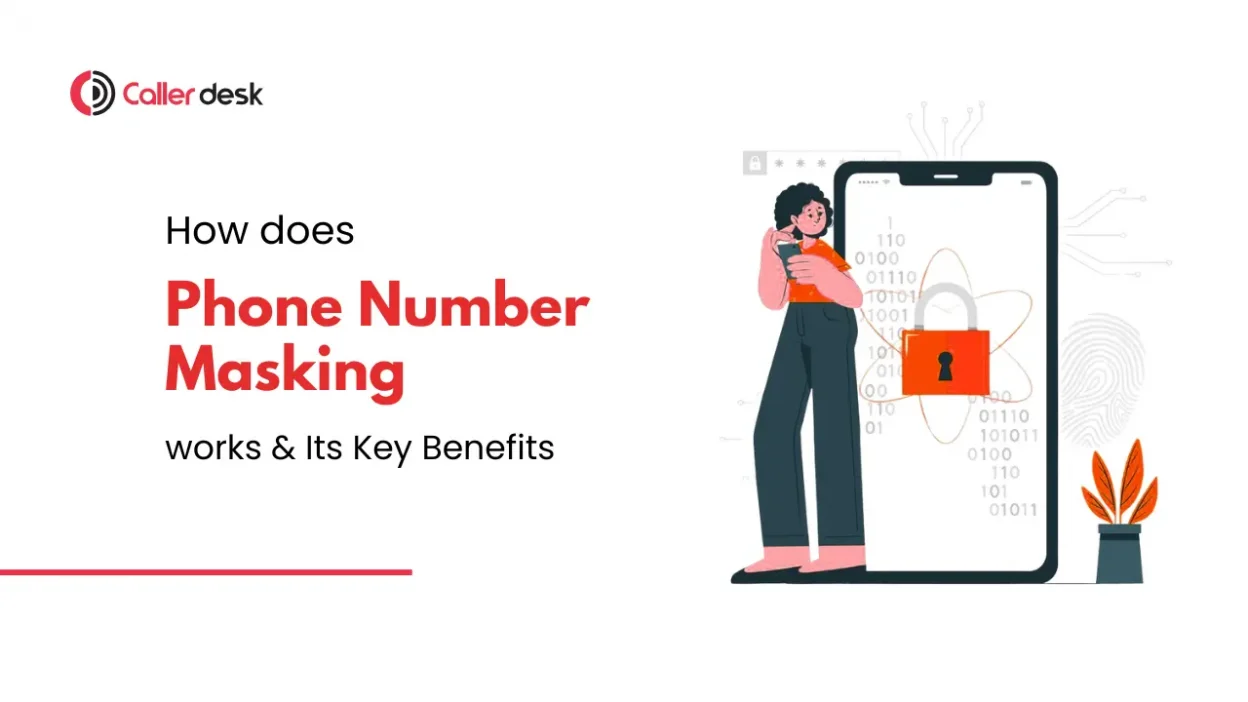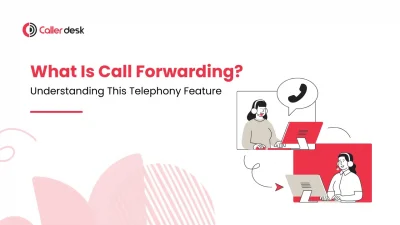Have you ever called a delivery agent or customer support and noticed that their number was hidden? That’s because of phone number masking.
Businesses handle thousands of customer calls every day. Keeping phone numbers private is important to prevent misuse and maintain trust. Call masking service helps companies hide real phone numbers while allowing smooth communication.
If you run a call center, e-commerce platform, or delivery service, using phone number masking in India is essential for protecting customer privacy.
Let’s break it down in simple terms.
What is Phone Number Masking?
Phone number masking is a technology that hides real phone numbers and shows a temporary virtual number instead. This ensures that neither the customer nor the business representative can see each other’s actual contact details.
Many businesses in India use number masking solutions, including:
- E-commerce platforms to protect customer details from delivery agents.
- Ride-hailing apps so drivers and passengers can talk safely.
- Call centers to keep customer phone numbers private.
With increasing privacy concerns and data protection laws in India, using a phone number masking service helps businesses stay compliant while ensuring customer trust.
How Does Phone Number Masking Work?
The process is simple:
- A customer calls a business.
- Instead of showing the customer’s real phone number, a temporary virtual number appears.
- The call is routed through a cloud telephony system, which ensures that both numbers stay hidden.
- The customer and business representative can talk, but neither can see the other’s real number.
This process happens instantly, keeping communication safe and private.
Key Benefits of Phone Number Masking
1. Privacy and Security
Without call masking, personal numbers can be misused. Number masking solutions ensure that customer contact details remain private.
For example, in e-commerce and ride-hailing services, it prevents delivery agents or drivers from seeing customer numbers, reducing the risk of spam calls or data misuse.
2. Improved Customer Trust
Customers are more likely to engage with a business that respects their privacy. Using a trusted phone number masking service shows that a company values security and builds long-term trust.
3. Makes Call Handling Easier & More Efficient
With increasing privacy regulations in India, businesses must protect customer data. Number masking solutions help ensure compliance with laws and prevent legal issues.
4. Reduces Spam and Fraud Risks
Exposed phone numbers can lead to spam calls, scams, and fraud. Masking phone numbers ensures that both customers and businesses communicate safely without revealing sensitive information.
For example, if a bank representative calls a customer, phone number masking prevents the number from being misused, ensuring secure transactions.
5. Makes Call Handling More Efficient
Businesses that handle a large volume of calls can benefit from mobile number masking solutions. Instead of managing multiple SIM cards and phone lines, companies can use a centralized cloud system to route and track calls more efficiently.
Industries That Use Phone Number Masking in India
Many businesses already use number masking services to protect customer privacy and improve communication. These industries include:
- E-commerce – To ensure safe communication between customers and delivery agents.
- Ride-hailing services – To protect the contact details of both drivers and passengers.
- Call centers – To keep customer and agent phone numbers private.
- Healthcare – To ensure confidentiality in doctor-patient calls.
- Banking and financial services – To prevent fraud by securing sensitive numbers.
How to Set Up Phone Number Masking for Your Business
Setting up a Call Masking Service helps businesses protect customer privacy and enhance security. Follow these simple steps to get started.
1. Choose a Phone Number Masking Service
Select a trusted provider that offers:
- Secure and reliable number masking.
- Easy integration with your call management system.
- Good customer support for technical help.
A strong number masking solution ensures safe and smooth communication.
2. Set Up Virtual Numbers
Once you choose a provider:
- Enable masking for both incoming and outgoing calls.
- Assign temporary virtual numbers to replace real numbers.
- Set up call routing to ensure calls reach the correct person.
3. Integrate with Your Existing System
To avoid technical issues:
- Ensure call logs are stored securely for monitoring and compliance.
- Connect the number masking solution with your CRM system.
4. Configure Masking Settings
Now, set up the phone number masking dashboard to match your business needs. You can:
- Decide when to mask phone numbers (e.g., only for outgoing calls).
- Select which calls should be masked (e.g., customer support, deliveries).
- Control who can access real numbers to maintain privacy.
This helps businesses comply with privacy laws while offering secure communication.
5. Train Employees on Using Masked Numbers
Make sure your team understands:
- Steps to handle technical issues related to call masking.
- How to use masked numbers during calls.
- Company privacy policies to protect customer information.
6. Test and Monitor Performance
- Conduct test calls to check if masked numbers are working correctly.
- Monitor call quality and privacy settings.
- Collect feedback from employees and customers to improve the system.
By regularly monitoring the setup, businesses can ensure secure and efficient communication.
Best Practices for Seamless Integration of Phone Number Masking
Setting up phone number masking helps businesses protect customer privacy, but it needs to be done correctly to avoid issues. Here are some simple steps to make sure everything works smoothly.
1. Compatibility Check
Before selecting a phone number masking service, make sure it works well with your existing tools, such as:
- Phones and headsets your team uses.
- CRM software to track customer interactions.
- Call management systems for smooth call handling.
Many providers offer free trials or demos—test them to see if the system runs smoothly before making a final decision.
2. Gradual Implementation
Instead of switching everything at once, introduce number masking gradually.
- Start with a small team—test the system, find any issues, and fix them.
- Once it works well, expand it to other teams for a complete rollout.
- This prevents problems from affecting your entire business.
3. Continuous Training
A system is only useful if employees know how to use it properly.
- Train your team on how masked phone numbers work.
- Provide simple guides or video tutorials for troubleshooting.
- Keep them updated about new features and improvements.
Well-trained employees ensure smooth operations and better customer interactions.
4. Backup Plans
Technology can sometimes fail. To avoid business disruptions:
- Set up an alternative communication method, like a second cloud telephony system or regular phone lines.
- Test the backup plan regularly to make sure it works when needed.
- Train employees on how to handle calls during system downtime.
5. Regular Monitoring and Optimization
Once number masking is in place, keep an eye on how it’s working.
- Check system performance to fix call issues.
- Use reports and analytics to track usage and improve settings.
- Get feedback from employees and customers to make improvements.
By following these practices, you can setup phone number masking smoothly while enhancing security, efficiency, and customer trust.
Conclusion
Phone number masking is a must-have for Indian call centers and businesses that handle customer calls. It keeps phone numbers private, prevents misuse, and builds customer trust by ensuring safe and secure communication.
With the help of cloud telephony services, businesses can set up number masking easily, making their operations more efficient and secure while ensuring smooth call management.
For more details and expert advice on phone number masking and cloud telephony, visit CallerDesk today!





